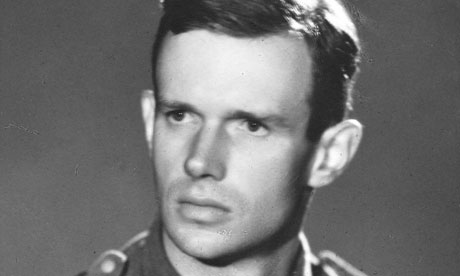
Frank Thompson is better known in Britain as brother of the historian EP Thompson, but in Bulgaria he is a national hero. Attached during the second world war to Special Operations Executive (SOE), he was parachuted into the Balkans to work with Bulgarian partisans; after two weeks of eating salted leaves and live wood-snails, he was captured, tortured and murdered by the Nazis.
There are several versions of Frank Thompson's execution aged 23 in June 1944. In one, pipe between teeth, he raised a clenched fist, the salute of the Fatherland Front; in another, he was pumped full of bullets while distracted in a ditch. Peter J Conradi's aim in this impeccably researched book is to establish the truth of Frank's final scenes and to understand how it was that a Communist, an intellectual and a poet – his finest poem, An Epitaph for my Friends, describes young men leaving "our books and flowers" to go to war – could have marched with such suicidal determination to his death. The least military of men, Frank was clumsy, chaotic, gentle and rebellious; he described himself when he joined the army as having become "a professional murderer".
Thompson belonged to a historical moment as "remote" from us, Conradi writes, as the Romantic period of the early 19th century, "of which his heroic age was the last flowering". EP, younger than his adored brother by four years, described Frank's generation as "too bloody innocent by half… too open to the world, and too loyal to each other to live".
What is striking is how conscious Frank was of his Romantic legacy: like Keats, he was "half in love with easeful Death", while his "dearest wish", he said, was to die for the cause of another country, as Byron had done for Greece. Few men have penned more epitaphs for themselves, or planned with more precision their heroic endings. "If anything," Frank wrote aged 21, "I am too brilliant… I shall be burned out at 23. I must seek an early death to keep my flame untarnished and immortal."
He was, indeed, brilliant, as testified by the prodigious quantities of poems, letters, stories and other papers he left behind. Proficient in nine languages – he addressed his murderers in Bulgarian – he read and thought deeply in his own, displaying the wisdom of a man four times his age. He knew that hatred involves a loss of innocence; he understood instinctively the morality of politeness, passing to a fellow prisoner the glass of water he was handed before his death. An aesthete who idealised the ascetic life, he joined the Communist party less because it stoked his idealism than because it appealed to his stoicism and his sense of noble sacrifice.
Frank seems never to have been a child; his high-minded father, EJ Thompson, writer and Oxford academic, raised his son on the belief that men should be tested by war, that it should cost "everything a man has, to face the breaking of his body and mind". Frank's mother, Theo, would later blame her own exacting standards on the solidifying of her son's chivalric personality. His school days at Winchester, vividly recreated by Conradi, reinforced the ideal of the "good death, the public death". The years 1936–46 were called by EP Thompson "the decade of heroes"; between the forbidding rigour of home life and the ethics of the school playing fields, Frank's world was mired in the vocabulary of heroism.
It is no wonder that he drank like a fish. His parents worried that he might be an alcoholic, and few are the accounts of his single year of undergraduate life at New College, Oxford in which he is not in his cups. "Why," Conradi asks, "was Frank self-destructive?" Enter the 19-year-old Iris Murdoch, destroyer of men. When she first meets Frank he is lying drunk in the entrance hall of the Oxford Union with his head inside a telephone box.
She "waddled" rather than danced and her figure was "too thick to be good", but Iris became Frank's muse. Like him, she wrote poems and believed in living, as she put it, "vividly, individually, wildly, beautifully", and she persuaded him to become a Communist. "I'd never thought of it before," Frank confessed, and "felt it would be wise to sober up before deciding. Then I staggered home and lay on a sofa… announcing to the world that I had met a stunner of a girl and was joining the Communist party for love of her."
His commitment to Iris seems stronger than his love of Stalin, but in his goodness he missed the violence of them both. Had Frank lived, Conradi suggests, he would have parted company with Russia, but would he have stayed with Iris? Forty years later she claimed that they had agreed to marry, but there is no corroborating evidence for this. After four years of corresponding while Frank was based in the Middle East, he told her that he had at last stopped longing for her body, but her letter informing him that she had happily lost her virginity to an old school friend of his may have played a part in Frank's decision to enter Bulgaria. Whatever the case, "Not even Iris was enough", as his mother put it, to make her son want to survive.
"Since we cannot enjoy his company in the flesh," Conradi concludes, "biography is one way of celebrating him in spirit." It is a fine description of the biographer's role, and generous quotations from Frank Thompson's letters and poems recreate his bulky, restless, energetic presence. But it is Conradi's own more subtle presence that locks the reader into the narrative: "I see him, to his fingertips, as a Popular Front intellectual," he writes of Frank at one point, elsewhere confiding: "It is moving to me that half a dozen of his school contemporaries are still with us." A Very English Hero is a pensive, moving and very personal book.

